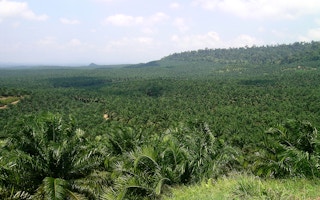With devastating fires in Indonesia providing a backdrop for the destruction wrought by unrestrained plantation development, the Malaysian Borneo state of Sabah on Wednesday announced it is pressing forward with a plan to certify 100 per cent of its palm oil production under criteria set by the Roundtable on Sustainable Palm Oil (RSPO) by 2025.
The initiative aims to differentiate Sabah’s palm oil from other producers, while addressing environmental problems and boosting productivity of existing plantations as part of a broader push to shift toward a more sustainable and diversified economy.
According to a declaration issued by the Sabah Forestry Department, the Sabah state government will provide technical assistance to implement the program, including group certification to small holders at no cost.
Larger companies operating in concessions managed by the Forestry Department have already been given deadlines to get RSPO certification, which requires producers to adopt production safeguards that reduce environmental and social impacts of cultivation and production.
Officials say the program will better position Sabah as other states and regions enter the palm oil business. Sabah accounts for 12 per cent of global palm oil production, but expects to see that share fall with rapid plantation expansion in other parts of Asia, Latin America, and Africa.
“In time to come, with increasing expansion of oil palm plantations in other countries with suitable land to spare, Sabah’s share of the world market will shrink. Further to that, on costs alone, Sabah might not be able to compete and it is unlikely that Sabah will be in a position to expand its land area for planting further, due to the scarcity of lands and the marginal quality of whatever land is still available,” said the declaration.
“Hence, to remain competitive with its CPO and its oil palm products salable economically, Sabah has to upgrade its position by competing on the basis of governance and not size, which it is unable to do.”
“Certified Sustainable Palm Oil as a brand for Sabah’s oil palm, shall elevate its position as a producer of responsible oil palm. This is what will keep us competitive,” the declaration continued. “The current forest fires, allegedly caused by bad oil palm development practices, must never be associated with Sabah’s oil palm.”
The plan puts Sabah on track to become the first state to fully adopt certification for all of its producers. Advocates say the so-called “jurisdictional approach” could be an effective way to reduce risks in commodity supply chains by creating “safe” markets for buyers while also cutting transactions costs associated with certifying each individual plantation or farm.
The approach operates on the premise that producers in a jurisdiction would pressure non-compliant peers to come into compliance for fear of losing certification for the entire group. Monitoring would help ensure producers are abiding by the rules, while higher margins from higher prices and yields would provide them an additional incentive to participate.
The certification program is a central component of Forever Sabah, a multi-stakeholder initiative that endeavors to transform Sabah’s economy.
“In Forever Sabah, we support a circular economy that respects the interconnectedness of life and we see this coming to fruition in future for the palm oil sector with Sabah’s commitment on certification,” said Forever Sabah director Cynthia Ong in a statement.
“The jurisdictional level program is one that will put us on the right track to collectively support livelihoods and protect the environment. This jurisdictional approach could guarantee Sabah a key place in global markets that, even before the haze, do not accept business as usual in the palm oil sector.”
“The jurisdictional level CSPO initiative will be supported with precision and scientific agricultural practices to ensure yield can be increased with the same amount of land,” Ong continued. “This includes guidance on conserving insect population for pollination, recycling Palm Oil Mill Effluent (POME) as fertilizer, replanting with high-yield and genetically resilient plantlets, and community workshops to share latest best practices.”
Forever Sabah envisions going well beyond the palm oil sector, including establishing wildlife corridors, restoring forests degraded by logging, and setting up new protected areas. The initiative includes programs to foster polyculture and agroforestry, community-based ecotourism, and more responsible stewardship of marine resources.
Palm oil production has had a substantial impact in Sabah: roughly a fifth of the state’s land mass has been converted to plantations, including areas once covered by biologically-rich lowland forests that house endangered orangutans, clouded leopards, and pygmy elephants. However the state still retains significant blocks of healthy forest, providing hope that curbing further destruction and restoring corridors of habitat could help ensure a future for wildlife.
Palm oil
Due to its high yield which makes it a cheap source of vegetable oil, palm oil is widely used as a cooking oil, a fat in processed foods like cookies and crackers, and an ingredient in cosmetics and cleaning products.
The world produced 54.3 million metric tons of palm oil in 2013. Indonesia accounted for roughly half of that production, while Malaysia came in about 35 percent.










